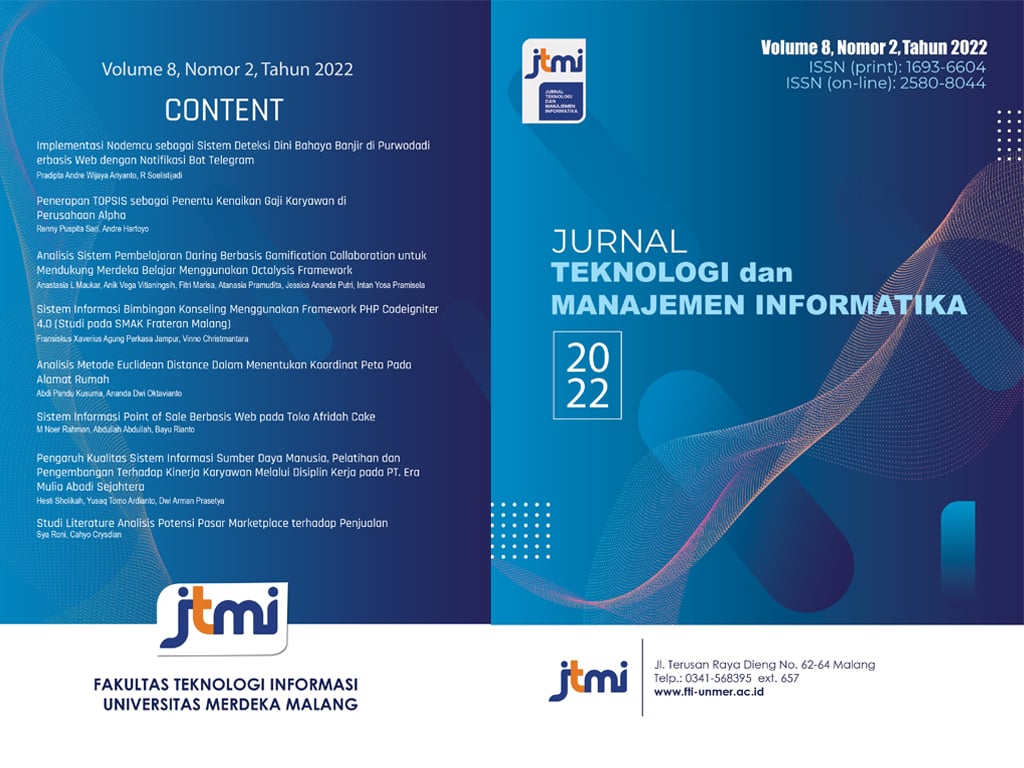Analisis Sistem Pembelajaran Daring Berbasis Gamification Collaboration untuk Mendukung Merdeka Belajar Menggunakan Octalysis Framework
DOI:
https://doi.org/10.26905/jtmi.v8i2.7855Keywords:
Gamifikasi, Octalysis Framework, E-Learning. Motivasi BelajarAbstract
The COVID-19 pandemic has had a major impact on many things. Education, which is one of the important aspects in supporting human life, also felt the impact of the pandemic. Based on Circular Letter Number 4 of 2020 concerning the Implementation of Education Policies during the emergency period of the spread of COVID-19, the government has a policy that face-to-face education is not allowed to be carried out. Therefore, the world of education began to implement distance learning or e-Learning. Â In addition to how to teach and learn, there are other things that need to be considered for the success of the process. Another thing is student learning motivation. Changes in the teaching and learning process also have an impact on student learning motivation. In this study, a questionnaire has been distributed to find out the core drive of student learning motivation. Based on a questionnaire that has been filled out by 167 respondents, the core drive that influences students' learning motivation is at a high level. This indicates that the level of student learning motivation during the COVID-19 pandemic is still high.Downloads
References
Gunawan, N. M. Y. Suranti, and Fathoroni, “Variations of Models and Learning Platforms for Prospective Teachers During the COVID-19 Pandemic Period,†Indones. J. Teach. Educ., vol. 1, no. 2, pp. 61–70, 2020.
S. Anshori, “Pemanfaatan TIK sebagai Sumber dan Media Pembelajaran di Sekolah,†J. Ilmu Pendidik. PKn dan Sos. Budaya, vol. 1, no. 1, pp. 10–20, 2017, [Online]. Available: file:///C:/Users/WINDOWS 10/Downloads/Documents/61-Article Text-540-1-10-20191223.pdf.
E. P. Febrianti, “Motivasi Belajar Menurun Imbas dari Covid-19,†pp. 1–7, 2021.
J. Landsell and E. Hägglund, “Towards a Gamification Framework : Limitations and Opportunities When Gamifying Business Processes,†2016.
F. Marisa, S. S. S. Ahmad, Z. I. M. Yusoh, T. M. Akhriza, A. L. Maukar, and A. A. Widodo, “Analysis of Relationship CLV with 8 Core Drives Using Clustering K-Means and Octalysis Gamification Framework,†J. Theor. Appl. Inf. Technol., vol. 98, no. 20, pp. 3151–3164, 2020.
Y. Alpian, S. W. Anggraeni, U. Wiharti, and N. M. Soleha, “Pentingnya Pendidikan Bagi Manusia,†Jurna Buana Pengabdi., vol. 1, no. 1, pp. 66–72, 2019, doi: .1037//0033-2909.I26.1.78.
F. U. Firdausi and P. P. Setiani, “Pengembangan Modul E-Learning Berbasis Web Dalam Pembelajaran Pendidikan Pancasila dan Kewarganegaraan Pada Mahasiswa Ikip Budi Utomo Malang,†J. Mitra Pendidik. (JMP Online), vol. 2, no. 11, pp. 1203–1217, 2018, doi: 10.51836/je.v4i2.92.
A. S. Sajiatmojo, “Penggunaan E-Learning Pada Proses Pembelajaran Daring,†Teach. J. Inov. Kegur. dan Ilmu Pendidik., vol. 1, no. 3, pp. 229–235, 2021, doi: 10.51878/teaching.v1i3.525.
M. T. Agustina and D. A. Kurniawan, “Motivasi Belajar Mahasiswa di Masa Pandemi Covid-19,†J. Psikol. Perseptual, vol. 5, no. 2, pp. 120–128, 2020, doi: 10.24176/perseptual.v5i2.5168.
A. Cahyani, I. D. Listiana, and S. P. D. Larasati, “Motivasi Belajar Siswa SMA pada Pembelajaran Daring di Masa Pandemi Covid-19,†IQ (Ilmu Al-qur’an) J. Pendidik. Islam, vol. 3, no. 1, pp. 123–140, 2020, doi: 10.37542/iq.v3i01.57.
Nurfaisal, “Motivasi Belajar Siswa Selama Pandemi Covid-19,†J. Ilm. MEA (Manajemen, Ekon. dan Akuntansi), vol. 5, no. 1, pp. 1800–1808, 2021.
F. Marisa, T. M. Akhriza, A. L. Maukar, A. R. Wardhani, S. W. Iriananda, and M. Andarwati, “Gamifikasi (Gamification) Konsep dan Penerapan,†J. Inf. Technol. Comput. Sci., vol. 5, no. 3, pp. 219–228, 2020.
S. Oliveira and M. Cruz, “The Gamification Octalysis Framework within the Primary English Teaching Process: the Quest for a Transformative Classroom,†Rev. Lusofona Educ., vol. 41, pp. 63–82, 2018, doi: 10.24140/issn.1645-7250.rle41.04.
T. Sulispera and M. Recard, “Octalysis Gamification Framework for Enhancing Students’ Engagement in Language Learning,†Dialekt. J. Pendidik. Bhs. Ingg., vol. 8, no. 2, pp. 103–128, 2020.
F. Marisa, S. S. S. Ahmad, Z. I. M. Yusoh, A. L. Maukar, R. D. Marcus, and A. A. Widodo, “Evaluation of Student Core Drives on e-Learning during the Covid-19 with Octalysis Gamification Framework,†Int. J. Adv. Comput. Sci. Appl., vol. 11, no. 11, pp. 104–116, 2020, doi: 10.14569/IJACSA.2020.0111114.
C. Gellner, I. Buchem, and J. Müller, “Application of The Octalysis Framework to Gamification Designs for The Elderly,†Proc. Eur. Conf. Games-based Learn., pp. 260–267, 2021, doi: 10.34190/GBL.21.022.
Downloads
Additional Files
Published
Issue
Section
License
Authors who publish with this journal agree to the following terms:
(1)Â Copyright of the published articles will be transferred to the journal as the publisher of the manuscripts. Therefore, the author confirms that the copyright has been managed by the journal.
(2) Publisher of JTMI: Jurnal Teknologi dan Manajemen Informatika is University of Merdeka Malang.
(3) The copyright follows Creative Commons Attribution–ShareAlike License (CC BY SA): This license allows to Share — copy and redistribute the material in any medium or format, Adapt — remix, transform, and build upon the material, for any purpose, even commercially.




